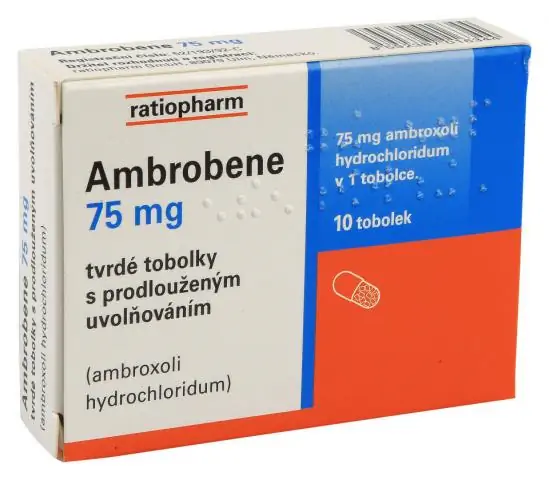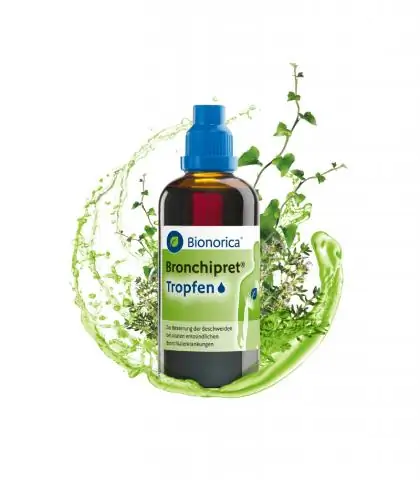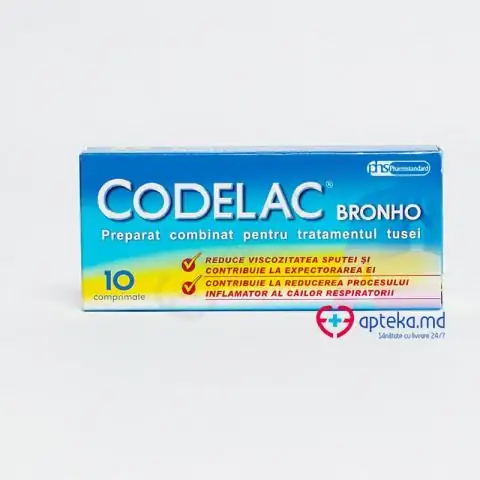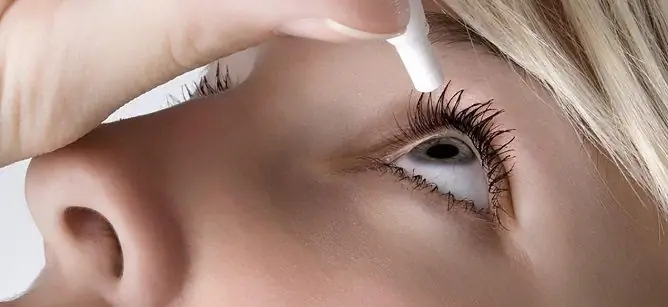- Author Rachel Wainwright wainwright@abchealthonline.com.
- Public 2023-12-15 07:39.
- Last modified 2025-11-02 20:14.
Zaditen
Zaditen: instructions for use and reviews
- 1. Release form and composition
- 2. Pharmacological properties
- 3. Indications for use
- 4. Contraindications
- 5. Method of application and dosage
- 6. Side effects
- 7. Overdose
- 8. Special instructions
- 9. Application during pregnancy and lactation
- 10. Use in childhood
- 11. For violations of liver function
- 12. Drug interactions
- 13. Analogs
- 14. Terms and conditions of storage
- 15. Terms of dispensing from pharmacies
- 16. Reviews
- 17. Price in pharmacies
Latin name: Zaditen
ATX code: S01GX08
Active ingredient: ketotifen (Ketotifen)
Manufacturer: Excelvision (France); Sandoz Pharma Ltd. (Sandoz Pharma Ltd.) (India); Sandoz Pharma (Switzerland); KRKA d.d. (KRKA, dd) (Slovenia)
Description and photo update: 2019-26-08

Zaditen - antiallergic agent.
Release form and composition
Dosage forms:
- Tablets (10 pcs. In a blister, 3 packs in a box);
- Syrup for children (100 ml in vials);
- Eye drops: transparent, colorless or yellowish liquid, odorless (5 ml in polyethylene bottles with a dropper, in a cardboard box 1 bottle).
The active substance of Zaditena is ketotifen:
- 1 tablet - 1 mg (as hydrogen fumarate);
- 1 ml of syrup - 0.2 mg;
- 1 ml drops - 0.25 mg, which is equivalent to 0.345 mg of ketotifen hydrogen fumarate.
Auxiliary components in the composition of drops: sodium hydroxide (1M solution), glycerol, benzalkonium chloride, water for injection.
Pharmacological properties
Zaditena is characterized by an antihistamine effect, which manifests itself both with systemic and local application.
Pharmacodynamics
Both in vitro and in vivo, ketotifen inhibits the release of mediators (platelet activating factor, histamine, prostaglandins, and leukotrienes) from cells involved in type I allergic reactions (neutrophils, basophils, eosinophils and mast cells). The drug helps to suppress chemotaxis, prevents the activation and degranulation of eosinophils, stabilizes cell membranes by inhibiting phosphodiesterase and reducing the content of cyclo-AMP. Also, ketotifen is a blocker of H 1 -histamine receptors.
Pharmacokinetics
When using Zaditen in the form of eye drops, the content of ketotifen in the blood after instillation into the conjunctival cavity for 14 days was predominantly below the quantitative limit of 20 pg / ml.
With systemic use, approximately 50% of the active substance is metabolized in the liver as a result of the first pass effect. The maximum concentration of ketotifen in blood plasma is recorded within 2-4 hours after oral administration. The degree of binding to blood plasma proteins is 75%.
Ketotifen is excreted in a biphasic manner. The early half-life is 3-5 hours, and the drug is finally excreted from the body after 21 hours. Ketotifen is excreted in the urine: 60-70% of the dose taken in the form of inactive glucuronide metabolites, and 1% - unchanged.
Indications for use
Tablets and syrup for children
- Prevention and treatment of chronic and acute urticaria, atopic dermatitis, allergic rhinitis, conjunctivitis;
- Allergic bronchitis;
- Prevention of attacks of bronchial asthma, including mixed form;
- Hay fever (asthmatic symptoms).
Eye drops
Allergic conjunctivitis (prevention and treatment).
Contraindications
- Pregnancy period;
- Individual hypersensitivity to ketotifen.
In addition, the use of the drug is contraindicated:
- Tablets and syrup: breastfeeding period;
- Eye drops: children under 12 years of age.
With caution, tablets and syrup should be prescribed to patients with liver failure, epilepsy.
The use of Zaditen eye drops during lactation should be accompanied by close medical supervision.
Method of administration and dosage
Pills
Zaditen tablets are taken orally, with meals. The dosage regimen for adults is 1 mg 2 times a day (morning and evening). The course of treatment is 3 or more months. In the absence of a sufficient clinical effect, a single dose can be increased to 2 mg. A gradual (within 2-4 weeks) discontinuation of therapy is recommended.
Syrup for children
Zaditen syrup is taken orally. The recommended dosage has age restrictions:
- Age up to 6 months - 0.05 mg per 1 kg of body weight;
- 6 months-3 years - 0.5 mg 2 times a day;
- 3 years and older - 1 mg 2 times a day.
Treatment should be continued for at least 3 months.
Cancellation of the drug is carried out with a gradual dose reduction over a period of 0.5-1 month.
Eye drops
Zaditen eye drops are used conjunctivally. Daily dosage - 1 drop 2 times a day for one and a half months. Instillation is performed in both eyes.
Side effects
Tablets and syrup for children
- Digestive system: nausea, vomiting, dry mouth, constipation, increased appetite, gastralgia;
- Nervous system: dizziness, drowsiness, slowing down of reaction rate (disappear after 2-3 days of therapy), feeling of fatigue, sedation; rarely - sleep disturbances, anxiety, nervousness (especially in children);
- Urinary system: cystitis, dysuria;
- Others: allergic skin reactions, thrombocytopenia, weight gain.
Eye drops
- Organ of vision: rarely - dry eyes, decreased visual acuity; in some cases - photophobia, a feeling of cramps during instillation, a feeling of pain in the eyes, conjunctivitis, subconjunctival hemorrhage;
- Dermatological reactions: rarely - skin rash; in some cases - allergic reactions, eczema;
- Others: rarely - increased fatigue, headache; in some cases, dry mouth.
Overdose
Overdose cases of Zaditen when used in the form of eye drops have not been registered.
When taking the drug in the form of tablets or syrup for children in high doses, the following symptoms may be observed: depression of consciousness (from drowsiness to complete disorientation), seizures, heart palpitations, a sharp drop in blood pressure, circulatory coma.
In this case, you should rinse the stomach (if not much time has passed after taking Zaditen) and prescribe activated charcoal to the patient. Symptomatic therapy is also recommended. For convulsions, benzodiazepines or barbiturates are administered.
special instructions
Zaditen syrup and tablets are not intended to relieve attacks of bronchial asthma. In patients with bronchospastic syndrome and bronchial asthma, after the appointment of Zaditen, the cancellation of previous therapy with glucocorticoids, beta-adrenomimetics, adrenocorticotropic hormones should be carried out gradually, reducing daily doses for at least 2 weeks.
With the simultaneous administration of tablets or syrup and oral hypoglycemic agents, regular monitoring of the platelet count in the peripheral blood is necessary.
Due to the risk of relapse of asthmatic symptoms, abrupt interruption of treatment with tablets or syrup is contraindicated. With a strong sedative effect of the drug, it is recommended to reduce the usual dose during the first 2 weeks of therapy.
The syrup contains 2.35% (by volume) of ethyl alcohol and 600 mg / ml of carbohydrates.
Do not use drops for irritation or inflammation of the eyes, wearing contact lenses. Contact lenses are recommended to be removed before each instillation and put on only 15 minutes after the procedure.
When the drops are combined with other ophthalmic agents for local use, instillations should be carried out with a 5 minute break.
Influence on the ability to drive vehicles and complex mechanisms
During the period of application of the drops, patients should not drive vehicles and mechanisms.
When treating with tablets or syrup, it is necessary to be careful with potentially hazardous activities, the implementation of which requires increased attention and high speed of psychomotor reactions, including the management of vehicles and mechanisms.
Application during pregnancy and lactation
Due to the lack of clinical data on the effectiveness and safety of all dosage forms of Zaditen during pregnancy, the drug is not prescribed to women during gestation.
Tablets and syrup are contraindicated to be taken during lactation; if therapy is necessary, breastfeeding should be interrupted (stopped).
Zaditen eye drops for women who are breastfeeding are allowed to be used under strict medical supervision.
Pediatric use
According to the instructions, Zaditen is used in pediatric practice according to indications, according to the dosage regimen.
Age restrictions: for drops 3 years or 12 years (depending on the manufacturer of the drug); tablets are prescribed for children over 3 years old.
For violations of liver function
Patients with hepatic impairment should take Zaditen tablets and syrup with caution.
Drug interactions
The simultaneous use of tablets or Zaditena syrup enhances the effect of antihistamines, hypnotics, ethanol.
When combined with hypoglycemic agents, the risk of thrombocytopenia increases.
The interaction of drops with other drugs has not been established.
Analogs
Analogs of Zaditen are: Allergodil, Daltifen, Ifiral, Kromo Sandoz, Kromofarm, Ketotifen, Ketotifen Sopharma, Ketotifen-Ros, Lekrolin, Alomid, Kromohexal, Lastakaft, Allergokrom, Opatadin, Opatanol, Palla.
Terms and conditions of storage
Keep out of the reach of children. Store at temperatures up to 25 ° C. Shelf life - 2 years, after breaking the tightness of the bottle with drops - 1 month.
Terms of dispensing from pharmacies
Dispensed by prescription.
Reviews about Zaditen
Mostly there are positive reviews about Zaditen. Patients consider it to be a fairly effective remedy to combat the manifestations of allergies. They also note the almost complete absence of side reactions, but they often complain about its high cost.
Price for Zaditen in pharmacies
On average, the price of Zaditen in the form of tablets with a dosage of 1 mg for 30 pcs. in the package is about 1780 rubles.
Syrup for children and eye drops are currently not available for sale.

Anna Kozlova Medical journalist About the author
Education: Rostov State Medical University, specialty "General Medicine".
Information about the drug is generalized, provided for informational purposes only and does not replace the official instructions. Self-medication is hazardous to health!






